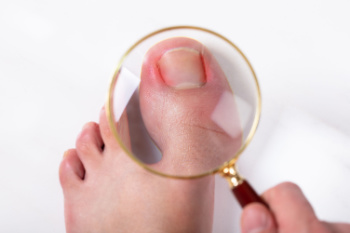
Ingrown toenails occur when the edges of a toenail grow into the surrounding skin, causing pain, redness, and swelling. In more severe cases, infection may develop, leading to pus or increased discomfort. Common causes include improper nail trimming, tight shoes, or trauma to the toe. Genetic factors can also play a role, as some people may have nails that are naturally curved. Treatment for an ingrown toenails often involves soaking the foot in warm water to reduce swelling and applying antibiotics if infection is present. In more persistent cases, a podiatrist may need to trim the nail, lift the edge, or remove part of the nail entirely. While home remedies can provide temporary relief, it is important to consult a podiatrist for safe and sterile professional care. They can ensure proper healing and help prevent future issues. If you are struggling with an ingrown toenail, it is suggested that you make an appointment with a podiatrist.
Ingrown toenails can become painful if they are not treated properly. For more information about ingrown toenails, contact one of our podiatrists of Comprehensive Foot & Ankle Center. Our doctors can provide the care you need to keep you pain-free and on your feet.
Ingrown Toenails
Ingrown toenails occur when a toenail grows sideways into the bed of the nail, causing pain, swelling, and possibly infection.
Causes
- Bacterial infections
- Improper nail cutting such as cutting it too short or not straight across
- Trauma to the toe, such as stubbing, which causes the nail to grow back irregularly
- Ill-fitting shoes that bunch the toes too close together
- Genetic predisposition
Prevention
Because ingrown toenails are not something found outside of shoe-wearing cultures, going barefoot as often as possible will decrease the likeliness of developing ingrown toenails. Wearing proper fitting shoes and using proper cutting techniques will also help decrease your risk of developing ingrown toenails.
Treatment
Ingrown toenails are a very treatable foot condition. In minor cases, soaking the affected area in salt or antibacterial soaps will not only help with the ingrown nail itself, but also help prevent any infections from occurring. In more severe cases, surgery is an option. In either case, speaking to your podiatrist about this condition will help you get a better understanding of specific treatment options that are right for you.
If you have any questions please feel free to contact our offices located in Lehigh Ave and Nazareth Hospital in Philadelphia, Collegeville Darby, and Langhorne, PA . We offer the newest diagnostic and treatment technologies for all your foot and ankle needs.
